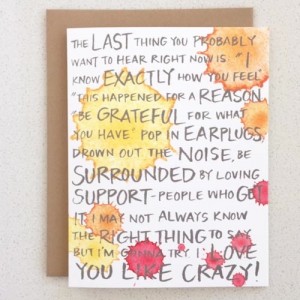In her article, 7 empathy cards for someone who’s lost a pregnancy. Because it’s hard to know what to say, Laura Willard presents the idea of “[acknowledging] the loss of a pregnancy the way we [address] any significant loss.” This is an idea that we have recently discussed in class but this article gives new insight on how to help those who have come face to face with this type of loss. A miscarriage is something that as a society we have a hard time addressing because most people really just don’t know what to do or what to say to those who have faced this type of loss. I am sure that most people understand that this can be a painful and tragic situation but coming up with the right words to say to a couple or individual that has lost a pregnancy can be impossible at times. For this reason, Dr. Jessica Zucker has come up with empathy cards that could be given to those who have lost a pregnancy. These cards sum up the words that many of us have difficulty coming up with. They are suited to all kind of tastes and I love the idea because it really helps bring this problem to light. My personal favorite is the one that finishes off with “I may not always know the right thing to say, but I’m going to try. I love you like crazy.” It perfectly summarizes the “loss for words” problem that surrounds this topic but offers a good approach to ease into the subject.
According to the article, roughly 20% of pregnancies end in loss. That means that one in five couples or individuals face this. That is an overwhelmingly high statistic but to some extent, there is no working around it. As the article says, that’s just molecular biology, in other words, that’s life, or at least the consequences of trying to make it. These cards help “change the culture of conversation – and lack of it – around miscarriage, pregnancy loss, and stillbirth” and will hopefully inspire people to face it with a little more grace.
Link to article: http://www.upworthy.com/7-empathy-cards-for-someone-whos-lost-a-pregnancy-because-its-hard-to-know-what-to-say?c=ufb1


